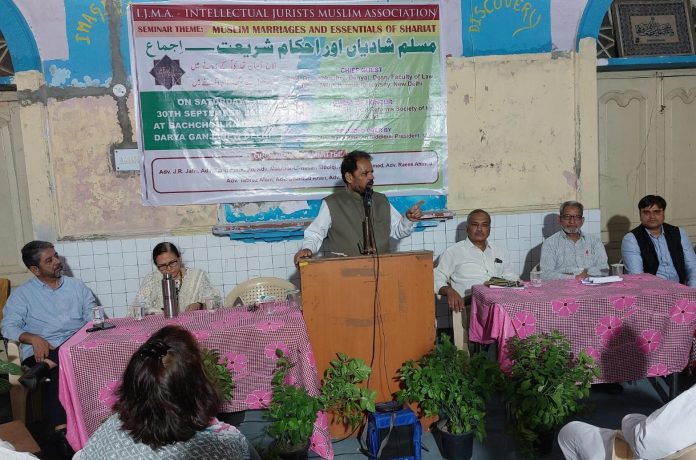New Delhi, 2 October 2023: Intellectual & Jurist Muslim Association (IJMA) organized a discussion on “Muslim marriages and the essentials of Shariah” at Bachhon Ka Ghar here on Saturday. The session was chaired by Advocate JH Jafri, senior vice president, IJMA.
Rana Parveen Siddiqui, president, IJMA sent her greetings as she could not attend the program due to last-minute travel.
The cascading effect of the evils of dowry is far more than what meets the eye, observed Dr. Aleem Falaki, Director, Social Reforms Society, Hyderabad. As the Guest of Honour, Dr. Falaki was delivering the keynote speech.
He said that we as Muslims remember the Sunnah of Holy Prophet ﷺ in many things, but we forget the sunnah method in marriages where no financial burden must be put on the girl or her parents/ family. As per Islam, marriages must be simple.
The situation has come to such a pass that dowry is not just a social evil but rather a question of survival because girls are not able to get married because of dowry pressures. Thus, destitute girls may be pushed either into prostitution or marrying outside the religious fold as they are left with no choice. Dr. Falaki quoted 122-year-old letter by poet Iqbal to Allama Kashmiri that girls will be forced to marry beyond frontiers of religion if society does not follow sunnah.
He added that those remaining silent on a sin also commit a sin. He emphasised that we must realise our mistakes and not just talk of this evil but rather practice the virtue of not promoting this evil in any manner just as the Sahaba gave up drinking alcohol when Allah had prohibited it.
Speaking as Chief Guest of the inaugural session, Prof. Dr. Kahkashan Yunus Danyal, Dean, Faculty of Law, Jamia Millia Islamia, and a distinguished member of IJMA, dwelt on this subject briefly but with a powerful reckoning. She said that the issue of dowry is linked with women’s rights because if a girl does not get her share in the family property, she feels she must take as much dowry as she can.
Dr. Danyal also said that property in the name of girl gives her a sense of security and so does having a high amount of Mehr.
She recounted tales of destitute women who are unable to complain to their respective families regarding violence from their husbands because they think their fathers or brothers will not support them if they ask for their share. Thus, it becomes a catch-22 situation for girls who remain in a dilemma.
Senior lawyer Shams Khwaja, who has practiced law both in India and the US, called on the advocates of IJMA, saying that they must acquire basic knowledge of Arabic if they wish to understand Muslim personal law better. He also said that having more knowledge of the Quran is essential for advocates as the Quran is the most authentic source of Islam whereas Hadith provides in greater details rules of social life than the holy Quran.
In response to a view that Zakat can only be utilised as per Quran in 7 masrafs (uses) and not for any other purpose, he opined that the Ulama must rise to the occasion through IJMA with other professionals to guide the society. He also suggested that the Supreme Court should have a personal law bench where scholars could be judges.
Raees Ahmad, advocate, brilliantly conducted the program with relevant Urdu poetry to the point and narration from Hadith of Holy prophet ﷺ. He enthralled the audience with his bits on the subject from Hadith literature while sharing verses from the Urdu poetry to introduce every speaker.
Earlier, the program commenced with a recitation of the Holy Quran by Qari Mohammed Feroz followed by the welcome address delivered by advocate Masroor-ul-Hasan Siddiqi, vice president, IJMA.
The introductory remarks were rendered by Tariq Farooqui, general secretary, IJMA. He gave a brief history of how IJMA came into being and how it brings together advocates, religious scholars, academicians, retired judges and professionals to fill the much-needed gap in discourse. He also highlighted that IJMA would be working towards mediation and solution of social problems. Mr Farooqui also remembered the founder of Hamdard Hakim Abdul Hameed statement about qaht-i-rijal (dearth of gentlemen) in society and hoped IJMA would fill this gap too.
IJMA, in its abbreviation, also means consensus, which is a source of law in Islam, he said.
The speakers also took questions from the audience.
The program came to an end with a vote of thanks by Advocate Aslam Ahmed (AoR, Supreme Court) and joint secretary of IJMA. Aslam Ahmed also explained the suggestion offered by Shams Khwaja regarding the Supreme Court bench that he suggested given that under English jurisprudence, the way of looking at religious text is different from how Islamic scholars look at the same. Under English rule, primary source takes precedence over secondary source whereas in Islam, the four sources of law i.e. Quran, Hadith, Ijma (consensus and Qiyas (analogy) in so far as India is concerned are all read together. Aslam also shared his views on every speech individually and thanked all the speakers profusely as well as the audience for their time and devotion to the subject.
Many prominent personalities like Inamur Rehman (Asst. Secretary, JIH) Shareef Ahmad (Member Delhi Waqf Board), Zia Hasan and Adil Ali Khan (Sr. journalists), Zulekha Jabeen and others also participated.




